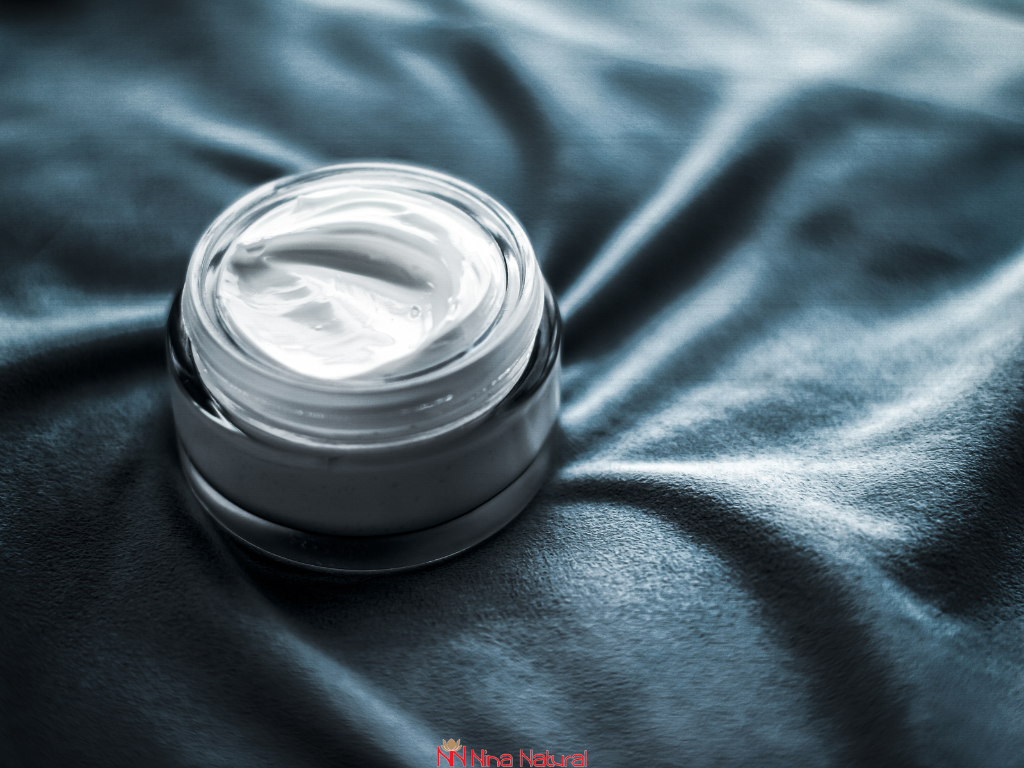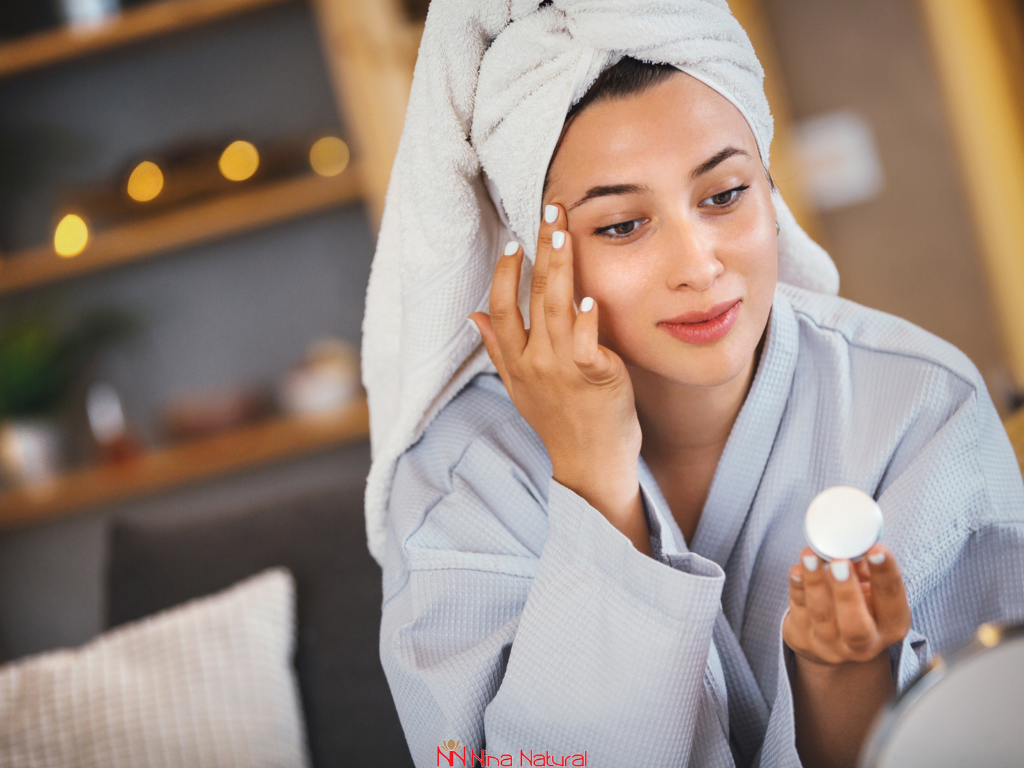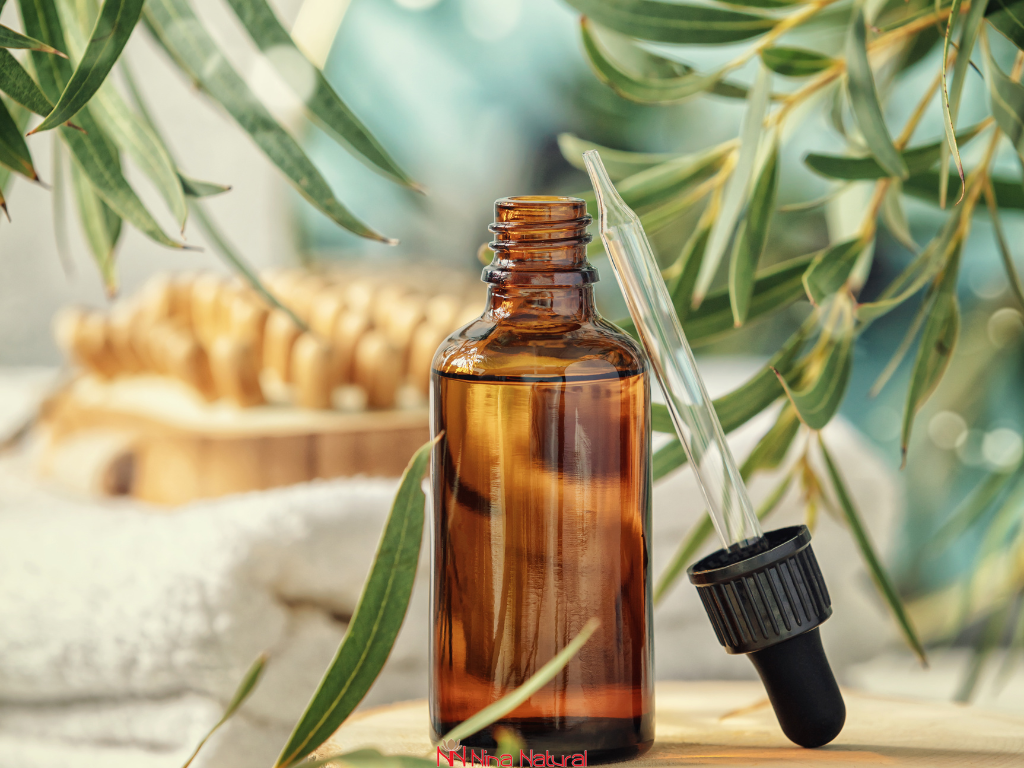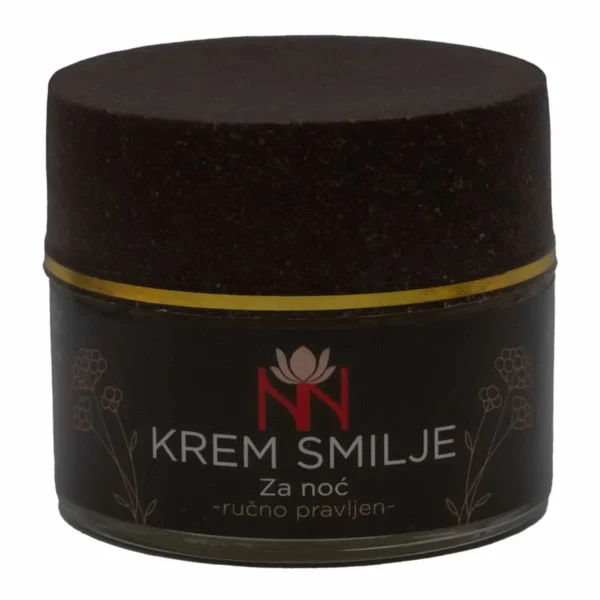Night Cream with Essential Oils: Pros & Cons

What is a night cream and what is its purpose?
Repairing skin damage: Night creams are formulated with soothing and regenerative ingredients that help calm inflammation and reduce redness caused by daily stressors. For example, ceramides restore the skin’s lipid barrier and prevent moisture loss, while botanical extracts such as chamomile oil work as anti-inflammatories, reducing irritation and redness.
Skin regeneration: While we sleep, skin cells go into intensive repair mode – between 11 p.m. and 4 a.m., the skin produces more collagen and absorbs active ingredients more effectively. The key ingredients in night creams (retinol, peptides, ceramides) support this renewal process.
Deep hydration: Night creams are often enriched with hyaluronic acid and plant oils that act like a “molecular sponge,” binding water deep within the skin. Hyaluronic acid, for example, can hold many times its weight in water, leaving the skin plump and hydrated. Natural oils like shea butter provide intensive nourishment and prevent dryness, making the skin more elastic.
Slowing skin aging: Night creams frequently include anti-aging ingredients such as retinol, peptides, and antioxidants (vitamin C, vitamin E, Q10, resveratrol) that stimulate collagen production and neutralize free radicals. Retinol encourages cell turnover and reduces fine lines, while peptides strengthen the skin barrier and improve firmness.
Helichrysum Night Cream
A blend of Helichrysum, almond, olive, wheat germ, calendula, and lavender oils Rich and rejuvenating night cream Effective nighttime protection and care for all skin types Prevents and reduces signs of aging Relaxing scent of natural oils Handcrafted in small batches
What are the differences between night creams and day creams?
1. Purpose and function
- Day creams are designed to protect the skin from external aggressors such as UV rays, pollution, stress, and climate changes. During the day, the skin is exposed to oxidative stress, so day creams typically focus on protection and barrier support.
- Night creams focus on repair, nourishment, and renewal. At night, the skin’s metabolism speeds up, collagen and elastin production increases, and the skin absorbs actives more efficiently.
Conclusion:
Day cream = protection.
Night cream = repair.
2. Active ingredients
| Cream type | Typical ingredients | Function |
|---|---|---|
| Day cream | SPF filters, antioxidants (vitamin C, coenzyme Q10, niacinamide), light hydrators (low-concentration hyaluronic acid, glycerin) | Protect against UV rays, free radicals, and pollution. Prevent premature aging and maintain hydration. |
| Night cream | Retinol and plant-based alternatives (bakuchiol), peptides, hyaluronic acid, ceramides, natural oils (jojoba, argan, immortelle), high-dose antioxidants | Stimulate cell renewal, collagen synthesis, deep hydration, repair damage, and even out skin tone. |
3. Texture and skin feel
Day creams are lighter and fast-absorbing, so they don’t leave the skin greasy or interfere with makeup. They often have a matte or soft finish.
Night creams are richer and creamier, designed to stay on the skin longer to provide intensive hydration and repair throughout the night.
4. Action throughout 24 hours
- Daytime: The skin is focused on defense. It faces UV rays, dust, climate, screen exposure, and stress. Day creams create a protective layer and neutralize free radicals.
- Nighttime: The skin switches into regeneration mode. Research shows that blood flow to the skin increases at night, improving nutrient delivery and accelerating cell repair. Night creams are designed to take advantage of this natural process.
5. Pairing with other products
- Day creams are often paired with antioxidant serums and must be combined with SPF if the cream does not already contain it.
- Night creams can be combined with active treatments like retinol, AHA/BHA acids, or niacinamide – but skin needs time to adapt gradually to avoid irritation.
What kind of formulations are best in night creams?
- Regenerative actives: Retinol (or plant-based alternatives like bakuchiol), peptides, and ceramides to restore collagen and strengthen the skin barrier.
- Intensive hydrators: Hyaluronic acid, squalane, and rich oils (shea butter, jojoba, argan, aloe vera, grapeseed) to deeply moisturize and prevent dryness. Shea butter, for example, locks in moisture and reduces itchiness, while rosehip oil improves elasticity and stimulates repair.
- Antioxidants and vitamins: Vitamin C, vitamin E, resveratrol, and Q10 to neutralize free radicals and brighten the skin. These help reduce dark spots and protect from oxidative stress.
- Botanical extracts and oils for soothing: Chamomile, lavender, aloe vera, rose, and calendula oils are anti-inflammatory and antibacterial, calming the skin and reducing irritation.
- Clean formulation: Ideally, night creams are dermatologically tested and hypoallergenic, free from parabens, perfumes, and harsh irritants. Labels such as cruelty-free and dye-free are also indicators of thoughtful, skin-safe formulas. Always perform a patch test before full use.

Why are essential oils used in night creams?
The use of essential oils in skincare reflects the clean beauty trend – consumers increasingly choose natural plant-based ingredients to avoid synthetic additives. Brands add essential oils not only for their aromatherapeutic properties, but also for their proven skin-regenerating benefits.
Most common essential oils in night creams:
- Lavender: A well-known oil for relaxation. It has antibacterial and soothing properties, reduces redness and irritation, and its scent promotes better sleep.
- Rosemary: A strong antioxidant and natural circulation booster. Refreshes the skin, supports regeneration, and strengthens resilience.
- Tea tree: Known as the “ultimate natural antiseptic.” Helps fight bacteria that cause acne, making it popular in products for oily and problematic skin.
- Chamomile: Potent anti-inflammatory properties, excellent for sensitive and irritated skin, reducing inflammation and redness.
- Rosehip oil: Rich in vitamins (provitamin A, C, E) and antioxidants. Deeply hydrates, stimulates cell renewal, and slows the signs of aging.
- Immortelle (Helichrysum): One of the most precious essential oils in natural skincare. Famous for its powerful anti-aging and regenerative properties – speeds up wound healing, reduces scars and pigmentation, stimulates collagen production, and improves elasticity. Its warm herbal scent also aids relaxation before sleep, making it perfect for night creams.
Benefits of essential oils in night skincare
Deep hydration and skin renewal: Natural oils like rosehip, jojoba, or shea butter provide lasting hydration and strengthen the protective barrier. Rosehip oil, for instance, has been shown to improve skin elasticity thanks to provitamin A and antioxidants.
Antimicrobial and anti-inflammatory action: Many essential oils have antiseptic and soothing properties. Tea tree oil eliminates acne-causing bacteria; lavender calms redness; chamomile actively reduces inflammation. Used together, they help manage breakouts and soothe irritations without disrupting skin balance.
Aromatherapy and better sleep: The relaxing aromas of oils like lavender and chamomile reduce stress, ease anxiety, and improve sleep quality. Incorporating these oils into a night cream creates a calming bedtime ritual that benefits both skin and mind.

Risks and side effects of essential oils
- Potential irritations and allergies: Essential oils are highly concentrated extracts and can trigger contact dermatitis if not used correctly. Patch testing is essential.
- Photosensitivity: Citrus oils (lemon, orange, bergamot) increase skin sensitivity to sunlight, which can cause burns or hyperpigmentation. These should be avoided on skin exposed to UV light.
- Issues for sensitive skin: Conditions like eczema, rosacea, or perioral dermatitis can be worsened by essential oils, even gentle ones like lavender or tea tree.
When to avoid essential oils in night creams
- Chronic skin conditions: Eczema, rosacea, perioral dermatitis.
- Pregnancy and breastfeeding: Some essential oils can trigger uterine contractions or pass into breast milk; consult a doctor first.
- After strong treatments: Avoid them after using retinol, chemical peels, or lasers, when the skin is especially fragile.
How to choose a safe night cream with essential oils
- Read the label: Look for dermatologically tested, hypoallergenic, and non-comedogenic formulas.
- Check concentrations: Essential oils should not exceed 1–2% in a safe night cream.
- Certifications matter: Labels such as cruelty-free, paraben-free, and eco/organic can indicate a thoughtful formulation.
- Always patch-test: Apply on a small area of skin before full use.
Example: Nina Natural’s Immortelle Night Cream combines helichrysum essential oil with almond, olive, wheat germ, calendula, and lavender oils. This rich formula nourishes the skin, protects against oxidative damage, and offers a soothing aroma – a great example of how natural oils can be used in safe concentrations for effective nighttime care.
What can you use instead of a night cream?
If you run out of night cream, you can temporarily use gentle, non-active alternatives:
- Baby creams or diaper rash creams (fragrance-free, rich in chamomile or shea butter).
- A homemade blend of vaseline and baby oil (ratio 1:2), creating an occlusive mask that locks in moisture.
- A simple day cream without SPF or acids, if it’s nourishing enough.
- Natural moisturizers like honey, aloe vera, or olive oil – though these should be used sparingly to avoid stickiness.
The key is to choose something gentle and soothing, as the night is meant for regeneration, not irritation.

